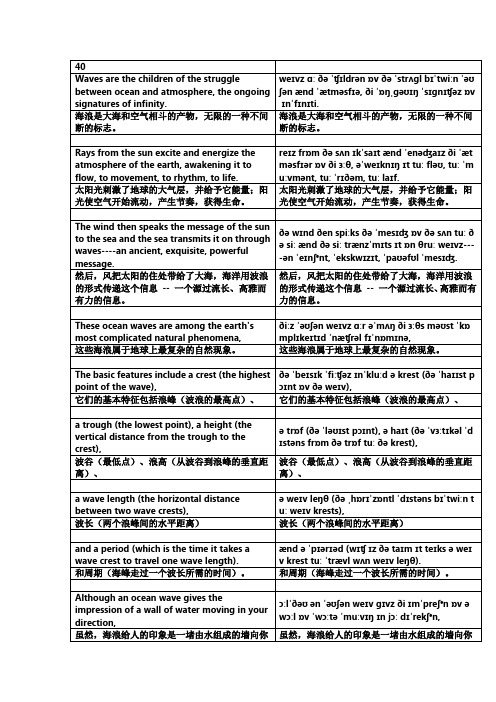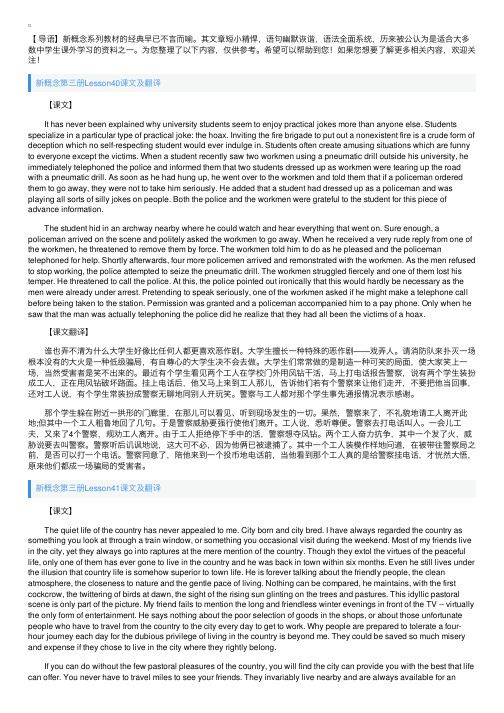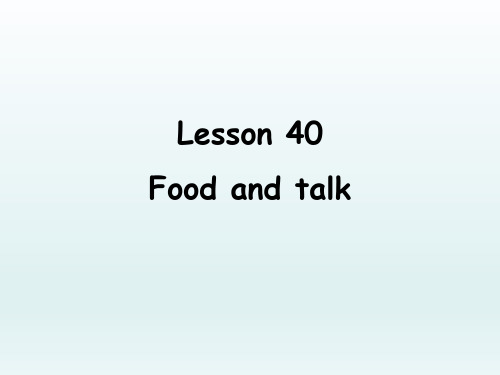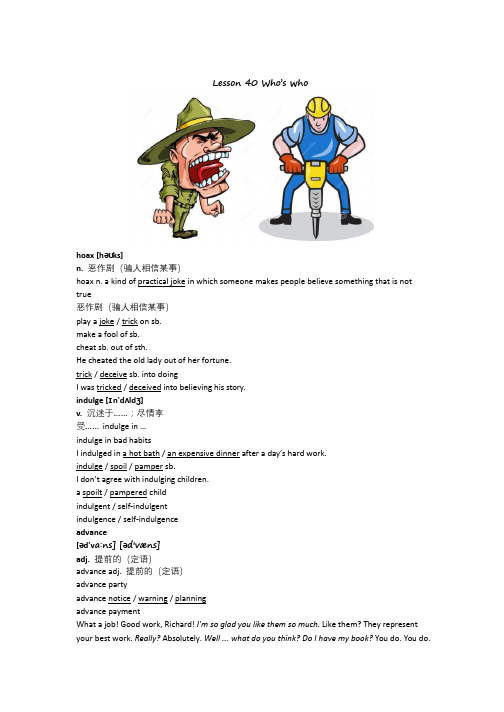lesson 40
新概念英语第四册 Lesson40 课文音标版讲义

40Waves are the children of the struggle between ocean and atmosphere, the ongoing signatures of infinity. weɪvz ɑːðəˈʧɪldrənɒvðəˈstrʌɡl bɪˈtwiːnˈəʊʃən ænd ˈætməsfɪə, ði ˈɒŋˌɡəʊɪŋˈsɪɡnɪʧəzɒv ɪnˈfɪnɪti.海浪是大海和空气相斗的产物,无限的一种不间断的标志。
海浪是大海和空气相斗的产物,无限的一种不间断的标志。
Rays from the sun excite and energize the atmosphere of the earth, awakening it to flow, to movement, to rhythm, to life. reɪz frɒm ðə sʌn ɪkˈsaɪt ænd ˈenəʤaɪz ði ˈæt məsfɪər ɒv ði ɜːθ,əˈweɪknɪŋɪt tuː fləʊ, tuːˈm uːvmənt, tuːˈrɪðəm, tuː laɪf.太阳光刺激了地球的大气层,并给予它能量;阳光使空气开始流动,产生节奏,获得生命。
太阳光刺激了地球的大气层,并给予它能量;阳光使空气开始流动,产生节奏,获得生命。
The wind then speaks the message of the sun to the sea and the sea transmits it on through waves----an ancient, exquisite, powerful message. ðə wɪnd ðen spiːks ðəˈmesɪʤɒv ðə sʌn tuː ðəsiː ænd ðəsiːtrænzˈmɪts ɪt ɒn θruː weɪvz----ən ˈeɪnʃᵊnt, ˈekskwɪzɪt, ˈpaʊəfʊl ˈmesɪʤ.然后,风把太阳的住处带给了大海,海洋用波浪的形式传递这个信息-- 一个源过流长、高雅而有力的信息。
新概念第三册Lesson40~42课文及翻译

【导语】新概念系列教材的经典早已不⾔⽽喻。
其⽂章短⼩精悍,语句幽默诙谐,语法全⾯系统,历来被公认为是适合⼤多数中学⽣课外学习的资料之⼀。
为您整理了以下内容,仅供参考。
希望可以帮助到您!如果您想要了解更多相关内容,欢迎关注!新概念第三册Lesson40课⽂及翻译 【课⽂】 It has never been explained why university students seem to enjoy practical jokes more than anyone else. Students specialize in a particular type of practical joke: the hoax. Inviting the fire brigade to put out a nonexistent fire is a crude form of deception which no self-respecting student would ever indulge in. Students often create amusing situations which are funny to everyone except the victims. When a student recently saw two workmen using a pneumatic drill outside his university, he immediately telephoned the police and informed them that two students dressed up as workmen were tearing up the road with a pneumatic drill. As soon as he had hung up, he went over to the workmen and told them that if a policeman ordered them to go away, they were not to take him seriously. He added that a student had dressed up as a policeman and was playing all sorts of silly jokes on people. Both the police and the workmen were grateful to the student for this piece of advance information. The student hid in an archway nearby where he could watch and hear everything that went on. Sure enough, a policeman arrived on the scene and politely asked the workmen to go away. When he received a very rude reply from one of the workmen, he threatened to remove them by force. The workmen told him to do as he pleased and the policeman telephoned for help. Shortly afterwards, four more policemen arrived and remonstrated with the workmen. As the men refused to stop working, the police attempted to seize the pneumatic drill. The workmen struggled fiercely and one of them lost his temper. He threatened to call the police. At this, the police pointed out ironically that this would hardly be necessary as the men were already under arrest. Pretending to speak seriously, one of the workmen asked if he might make a telephone call before being taken to the station. Permission was granted and a policeman accompanied him to a pay phone. Only when he saw that the man was actually telephoning the police did he realize that they had all been the victims of a hoax. 【课⽂翻译】 谁也弄不清为什么⼤学⽣好像⽐任何⼈都更喜欢恶作剧。
七年级英语下册Lesson40教材内容详解冀教版

______________________________
B.Doyou have a good habbits?你有好习惯吗?
I________ get up very early.
我__________很早起床。
Example:例如:
’s a circle.
It’s a square/triangle/circle/line.
How is the weather?
天气如何?
What’s the temperature?
气温多少度?
It’s_______degrees.
_____________度。
It’s doesn’t snow often in my city.
我所在的城市不经常下雪。
Adverbs副词
always总是
这不是你的自行车,是_________.
5.I’m g______ to have a new friend.
我________有一位新朋友。
6.Li Ming is 13. Kim is 13,too. They are the s_____ age.
李明13岁,吉姆也13岁。他们______龄。
delicious food in it.It helps keep the food fresh and cold.
好吃的食物。它能给食物保鲜、冷冻。
Now let’s go to your_____. This is your
现在我们去你的_______。这是你的床!
bed! And this way,please.Here is the____.
李明来到詹妮家。詹妮带李明参观她家。
新概念英语第二册Lesson40_42课文注释

新概念英语第二册Lesson40~42课文注释新概念英语第二册Lesson40课文注释1.next to, 挨着。
它既可以表示座位挨着也可以表示地理位置上挨着:Who was the man sitting next to you during the meeting?开会时坐在你旁边的那人是谁?There's a field/shop next to our house.我们家房子边上有一片田野/一个商店。
2.Mrs. Rumbold was a large, unsmiling lady in a tight black dress.兰伯尔德夫人是一位身材高大、表情严肃的女人,穿一件紧身的黑衣服。
(1)unsmiling的反义词为smiling(微笑的,喜气洋洋的)。
有些形容词前面可以加上前缀un-来表示相反的意义:comfortable (舒服的)/uncomfortable(不舒服的),true(真实的)/untrue(不真实的), interesting(有趣的)/uninteresting(无趣味的,乏味的)。
(2)in在这里表示“穿着”、“戴着”:A young man in a blue dress is inquiring for you.有位穿蓝衣服的小伙子在找您。
3.take one's seat, 在指定的位置上就座。
take a seat表示“坐下”,比sit要正式:Please take a seat.请坐。
take one's seat则表示位置事先已安排好:After everyone had taken his seat, the meeting/dinner party began.大家各自就座后,会议/宴会便开始了。
4.Her eyes were fixed on her plate and in a short time, she was busy eating. 她的眼睛盯着自己的盘子,不一会儿就忙着吃起来了。
新概念英语第二册lesson40课件共25张PPT

3. If I ______ you, I ______ more attention to English idioms
and phrases.
A. was; shall pay
B. am; will pay
C. would be; would pay D. were; would pay
4. —Alice, why didn’t you come yesterday? —I ______, but I had an unexpected visitor. A. had B. would C. was going to D. did
① v. 使……固定、安装 fix the picture on the wall She fixed a handle on the door. ② v. 修理 fix on使(目光、注意力等)集中于,盯着 fix one's eyes on sth./ one's eyes be fixed on sth.盯着……目不转睛 All the eyes were fixed on the blackboard.
2).If he had taken my advice,he would not have made such a mistake. 如果他听我的劝告的话,就不会犯这样的错误了。(事实:没有听我的话)
Exercises:
1. I don’t think that I shall fail. But if I ______, I would try again. A. should fail B. would fail
2.Mrs. Rumbold was a large, unsmiling lady in a tight black dress. unsmiling adj. 不笑的 unsmiling的反义词为 smiling 有些形容词前面可以加上前缀un-来表示相反的意义:
新概念英语第二册Lesson40foodandtalk课件

‘In despair, I asked her whether she was enjoying her dinner.’ 7. in despair 失望
Focus on grammar
1. If you park your car in the wrong place, a traffic policeman will soon find it.
句则推测想象的结果。 与现在事实相反的虚拟条件句 结构: if从句------一般过去时(be用were) 主句-------过去将来时(would/could/might/should+do) eg: If you ate more and talked less, we would both enjoy our dinner. If I were you, I would not go to the party.
overcoat.
A. But
B. Although C. How
D. What
Fill in the blanks 1
Food and talk Last week at a dinner party, the _h_o_s_te_s_s___ asked me to sit next to Mrs. Rumbold. Mrs. Rumbold was a large, _u_n_s_m_il_in_g__ lady in a __t_ig_h_t__ black dress. She did not even look up when I took my seat beside her. Her eyes were __f_ix_e_d__on her plate and in a short time, she was busy eating. I tried to make conversation. 'A new play is coming to "The __G_lo_b_e__" soon,' I said. 'Will you be seeing it?' 'No,' she answered. 'Will you be spending your holidays abroad this year?' I asked 'No,' she answered. 'Will you be staying in England?' I asked. 'No,' she answered. In _d_e_s_p_ai_r_, I asked her whether she was enjoying her dinner. 'Young man,' she answered, “if you ate more and talked less, we would both enjoy our dinner!"
新概念英语第3册课程讲义Lesson40

Lesson 40 Who’s whohoax [həʊks]n. 恶作剧(骗人相信某事)hoax n. a kind of practical joke in which someone makes people believe something that is not true恶作剧(骗人相信某事)play a joke / trick on sb.make a fool of sb.cheat sb. out of sth.He cheated the old lady out of her fortune.trick / deceive sb. into doingI was tricked / deceived into believing his story.indulge [ɪn'dʌldʒ]v. 沉迷于……;尽情享受…… indulge in …indulge in bad habitsI indulged in a hot bath / an expensive dinner after a day’s hard work.indulge / spoil / pamper sb.I don’t agree with indulging children.a spoilt / pampered childindulgent / self-indulgentindulgence / self-indulgenceadvance[əd'vɑ:ns] [əd'væns]adj. 提前的(定语)advance adj. 提前的(定语)advance partyadvance notice / warning / planningadvance paymentWhat a job! Good work, Richard! I'm so glad you like them so much. Like them? They represent your best work. Really? Absolutely. Well ... what do you think? Do I have my book? You do. You do.There’s a book here. I'll have a contract and an advance payment waiting for you, first thing in the morning.in advanceRent must be paid one month in advance.in advance of …Galileo’s ideas were in advance of the age in which he lived.advanced adj. 高级的, 先进的advanced technologyan elementary / intermediate / advanced English courseelementary / intermediate / advanced English learnersremonstrate ['remənstreɪt] [rɪ'mɑ:nstreɪt]v. 抗议,规劝,告诫remonstrate with sb. (fml.) 向某人抗议The coach angrily remonstrated with the referee.Shortly afterwards, four more policemen arrived and remonstrated with the workmen. demonstrate v. 展示, 表明protest against …聚众抗议……complain (to sb.) of / about sth.Several people complained of cat-like noises at night and a businessman on a fishing trip saw the puma up a tree.Almost immediately he began to complain about the weather, for even though it was still summer, it rained continually and it was often bitterly cold.nag sb. to do …When my wife nagged me to do something about it, I told her that either I would have to buy a new mower or let the grass grow.pester sb. to do …From the moment he arrived there, he kept on pestering his doctor to tell him when he would be able to go home.ironically [aɪ'rɒnɪklɪ]adv. 讽刺地ironically / sarcasticallyAt this, the police pointed out ironically that this would hardly be necessary as the men were already under arrest.'Perfume, eh?' he asked sarcastically. 'You should have declared that. Perfume is not exempt from import duty.'ironic / sarcasticI was almost there when a sarcastic voice below said, 'I don't think the windows need cleaning at this time of the night.'irony / sarcasmwith heavy irony / sarcasm'Good of you to arrive on time,' George said, with heavy irony / sarcasm.hint / trace / touch of irony / sarcasmThere was a hint of irony / sarcasm in her voice.the irony of fateIt's ironic that she became a teacher ―she used to hate school.Ironically, his cold got better on the last day of his holiday.who’s who 谁是谁(名字、职务等)You’ll soon get to know who’s who in the company.which is whichThe twins are so alike that I can’t tell which is which.When Scarlet returned to the farm, the old maidservant began to tell her who married whom, who had what children and so on.It has never been explained why university students seem to enjoy practical jokes more than anyone else.nobody can explain why …it has never been explained why …造句:谁也无法解释玛雅(Maya) 文明为什么会突然从地球上消失(vanish)。
【新概念】第二册Lesson 40

Lesson 40.【单词】Hostess. 女主人【拓展词】host.n.主持人、主人Unsmiling.adj.不笑的,严肃的Tight.adj.紧身的Fix.v.凝视Globe.n.地球Despair.n.绝望=====================【精读】1. Last week at a dinner party, the hostess asked me to sit next to Mrs. Rumbold.在上星期一次宴会上,女主人安排我坐在了兰伯尔德夫人的身旁。
【拓展】cocktail party 鸡尾酒会birthday party 生日聚会tea party 茶话会dinner party 宴会evening party 晚会garden party 游园会weekend party 周末晚会Christmas party 圣诞晚会【动词搭配】sit next to sb. = sit close to sb坐在某人的旁边2. Mrs. Rumbold was a large, unsmiling lady in a tight black dress.兰伯尔德夫人是一位身材高大、表情严肃的女人,穿着一件紧身的黑衣服。
【语法】前置定语:large 和unsmiling两个形容词修饰lady.【搭配】男人“胖”:strong,heavy,sturdy;女人“胖”:large,plump。
3.She did not even look up when I took my seat beside her.当我在她旁边坐下时,她甚至连头都没有抬一下。
【短语】look up意为“向上看”4.Her eyes were fixed on her plate and in a short time, she was busy eating.她的眼睛盯着她的盘子,不一会儿就忙着吃起来了。
- 1、下载文档前请自行甄别文档内容的完整性,平台不提供额外的编辑、内容补充、找答案等附加服务。
- 2、"仅部分预览"的文档,不可在线预览部分如存在完整性等问题,可反馈申请退款(可完整预览的文档不适用该条件!)。
- 3、如文档侵犯您的权益,请联系客服反馈,我们会尽快为您处理(人工客服工作时间:9:00-18:30)。
课题Lesson 40 Unit Review
学习目标1.Mastery the important words and phrases of this unit.
2.Know how to use modal verbs correctly.
3.Know the model verbs that we always see in the sentences.
重点难点Important point:Mastery the important words and phrases Difficult point: How to use modal verbs .
教法
选择
practice课型Review
课前准备Exercises
是否采用
多媒体
no
教学时数1 课时
教学
课时
第 1 课时
备课
总数
第 40课时课堂教学过程设计
教学内容教师活动学生活动
Step1.Greeting
Step2.words
improve future careful carefully sick someday goal wife nobody choose rich poor should might lawyer key building give sb. some advice
be famous for between... and...
Step3.Explain the important points
1.might与maybe
二者都有可能或许的意思但词性不同
might是情态动词,与may一样,后接不带to的动词不定式,在句子中作谓语;maybe是副词,常放在句子开头.
例:Maybe he is right.
My book might/may be in my desk.
2.hope 与wish
(1)hope一般侧重于可能实现的愿望
常译为希望,wish一般侧重于表达不可能实现的愿望,常译为但愿.
I hope for success.我希望成功.
I wish for a plane. 我真想有架飞机.
(2).hope 和wish 都可跟that从句,但hope+that 表示希望wish+that表示但愿,且从句用虚拟语气,表示一种不可能实现的愿望.
I hope that they can come to see me.我希望他们会来看我.
I wish that I was a bird.但愿我是一只小鸟. greeting
Help the students
remind the words
then check the result
Lead the students to
review the important
language points of this
unit.
Explain the differences
between the words.
Help the students
understand the meaning
and master the usages
of them.
Greeting
Have a short
dictation to go
over the words
of unit 5
Review the
important language
points of this unit
with the help of the
teacher.
Know the
differences
between the words.
understand the
meaning.
教学内容教师活动学生活动(3)在简短答语中,so,not 可以和hope连用,wish不
能. Eg:I hope so.我希望如此.
3.too many 意为太多常用来修饰可数名词的
复数形式.
There are too many people in the street
Now.现在大街上有太多的人.
4.too much 意为太多常用来修饰不可数名词There is too much ice on the road, we can’t Walk quickly.路上的有太多的冰,我们走不快
5.great, big 和large
(1)big (在体积,面积,范围,程度,和强度方面)大
与large意思接近. a big park/man 大公园/高大的人(large一般不用于修饰人)
(2)This shirt is too big for me to wear.
这件衬衫太大了,我不能穿.
(2)great大多用于指重要性,特性,能力或程度(通常含褒义)用于形容人常作伟大的了不起的意思He’s a great man.他是个了不起的人物.
(3)large和great用于指数量时词义接近.
Step4 practice
Do the exercise on the exercise book.
Step5.homework. Set examples and ask
questions.
Guide and conduct.
check the answer with
the whole class
walk around the
classroom and help the
students to finish off the
exercises if necessary.
arrange the homework.
Understand and
grasp the language
points with the
teacher’s help.
Master the usage of
the language
points.
Write down the
notes.
Do the exercises.
Correct and know
the reasons.
Know the
homework.
作业设置Preview the new words and pheres of lesson 41.
教学札记
检查签阅
第周,应备课时,实备课时,共课时
评价:时间:签查(签章):。
